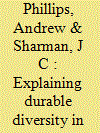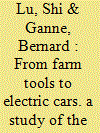| Srl | Item |
| 1 |
ID:
141844


|
|
|
|
|
| Summary/Abstract |
International Relations theories generally hold that increased interaction between units in an international system produces convergence in their forms through military competition, institutional emulation, or normative socialization. In contrast, we argue that diverse international systems can endure despite increasing interaction. The early modern Indian Ocean international system hosted a variety of statist, corporate, and imperial polities. Diversity endured for three reasons. First, powerful foreign and local actors held differing maritime and land-oriented preferences for conquest, which created the potential for coexistence between unlike polities. Second, congruent European and Asian ideas of heteronomy facilitated durable polity diversity. Third, strategies of localization enhanced enmeshment. Convergence on common polity forms failed to occur despite the presence of a statist model during this period. Subsequently, a reconfigured form of diversity under colonial empires succeeded this order. Greater attention to past diverse systems coheres with recent calls to study history to better understand not only contemporary instances of international hierarchy, but also unbundled and shared sovereignty regimes.
|
|
|
|
|
|
|
|
|
|
|
|
|
|
|
|
| 2 |
ID:
144176


|
|
|
|
|
| Summary/Abstract |
It is now recognised that China’s industrial clusters have played a particularly significant part in the prodigious economic transformations the country has experienced since the launch of reforms at the end of the 1970s. By studying the case of Yongkang, a county-level city in Zhejiang Province specialising in the manufacture of metal products, this article aims to increase understanding of how this rural area with a tradition of small-scale metal production has become, over the course of a few decades, an industrial cluster built around specific operations, and which economic, social, and political approaches have made these transformations possible.
|
|
|
|
|
|
|
|
|
|
|
|
|
|
|
|